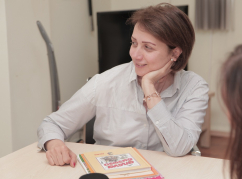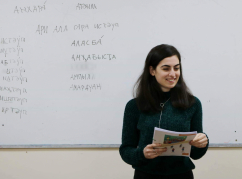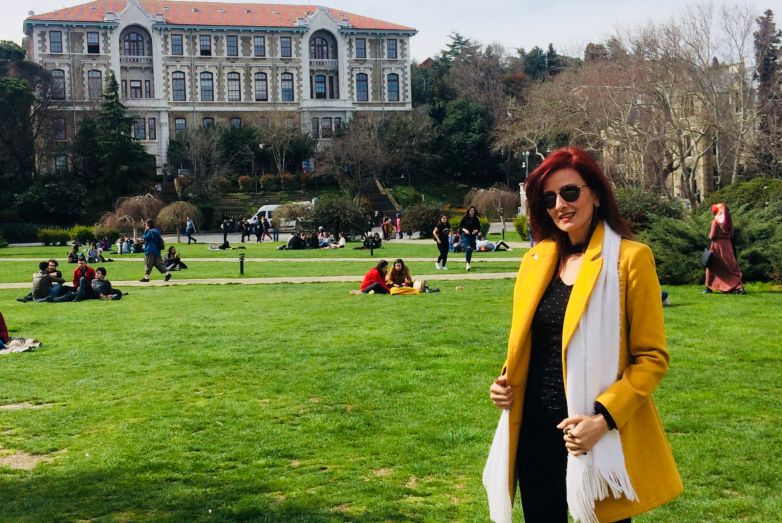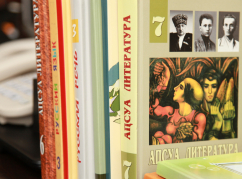Continuing the series of articles on how to learn the Abkhaz language, the WAC web information portal publishes material on teaching Abkhaz at the Bosphorus University and classes at the national centers of Turkey.
Said Bargandzhia
The Abkhaz language is today offered as one of the subjects for study at the most famous Turkish university, the Bosphorus University. The language course for eight years has been taught by a native of Abkhazia Gunda Ankvab.
According to the teacher, 17 people are currently studying in her group. All university students can attend free lectures, regardless of course or faculty.
The university has students from around the world, many of whom are interested in the Abkhaz language. For eight years of work, in addition to students from Turkey itself, Gunda Ankvab taught Abkhaz young people from America, Italy, Germany and even from Japan.
“Of course, among the students there were [and there are] representatives of the Abkhaz-Abaza Diaspora, but not as many as we would like,” Ankvab noted.
In 2015, the teacher compiled a book on the study of the Abkhaz language, which was published by the Bosphorus Printing House. She uses the methodology of this textbook, including various additions in her classes. According to Ankvab, the technique was developed by her under the guidance of Professor Sumru Oszoy.
“We start learning from basic knowledge. By the end of the fourth half of the year, students can speak basic Abkhaz. I not only teach my students the language, but also tell the story of my country [Abkhazia]. And by the end of the first half of the year, students show sympathy for it, [they have] interest and a desire to see my homeland. My students know that “to love” in Abkhaz is literally to see someone completely and to accept him as he is (Abkh. “Abziabara” - bzia (good), abara (see) - ed.). They know that everything we have passes through the heart (Abh. “агәы”): hope - агәыӷра, get angry - агәамҵра, like - агәаԥхара, desire - агәазыҳәара. They know that our most ancient language is consonant with nature,” Gunda Ankvab shared.
Gunda conducts lectures at the university almost on a voluntary basis. They are paid quite insignificantly. According to her, “there is no decent support.”
Students of the Bosphorus University have different motivation for studying the Abkhaz language.
Representatives of the Abkhaz Diaspora study it as a native: for many it is an opportunity to more closely communicate with their relatives and friends in Abkhazia. So, an Abkhaz Batukhan Avidzba, a student at the Faculty of History, decided to study the Abkhaz language, because it is his native language.
“I really like to learn Abkhaz. It is difficult, but I like the technique by which we do it. I teach it to communicate more freely with relatives,” said Avidzba.
Representatives of other nationalities choose the Abkhaz language mainly because they are interested in Abkhazia, the life and culture of its people. Many are planning to visit the Republic. But there are other motives. For example, a third-year student of the Faculty of Philology Anil Ozer, a Turk by nationality, gladly supplemented the course of his lectures with the Abkhaz one, since the language is of interest to him as a rare one.
“I decided to learn the Abkhaz language because it is little used and partly on the verge of extinction. I plan to use the Abkhaz in scientific work and when I visit Abkhazia. Of course, it is difficult, but it is possible to learn it,” said the student.
Gunda Ankvab has also taught courses in the Abkhaz language outside the university for over 18 years.
“Groups are created in our Caucasian and Abkhaz cultural centers. I teach courses in Kojael and Istanbul. The number of group members is always different: from 7 to 30 people. There are children from six to 13 years. The method of teaching children the Abkhaz language is also my own. They need an individual approach. Anyone who desires can attend classes, they are free,” said Gunda Ankvab.
One of the participants of the course, 64-year-old Ugur Osia, shared his impressions of the lessons.
“This is my native language, it is important for me to know it. It is difficult, especially in the perception of sounds. But I like the technique,” said Osia.
A seven-year-old Alp Ashkharaa, an Abkhaz boy, who is confident that the Abkhaz is given to him quite easily, is engaged in the children's group.
“We go to Abkhazia in the summer. The language is a little difficult, but we learn it while having fun, and I love it. For success we get prizes, so I can learn it, I learn the language quickly,” shared Alp Ashkharaa.
The Bosphorus University is the only university outside Abkhazia that, among other things, teaches the Abkhaz language. Each of 12,000 students of this university, one of the leading universities in Turkey, has the opportunity to study Abkhaz language for free. A special teaching methodology has been created within its walls, which over the years has improved and is used in language courses at national centers.




to login or register.